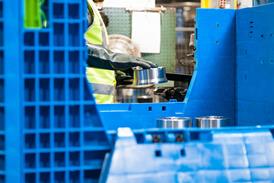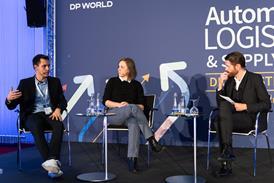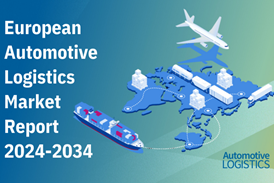Battery supply chain insight – Page 6
-
 Feature
FeatureProduction & logistics part 2: Questioning the future
This article is one of a series of pieces celebrating Automotive Logistics’ 20th anniversary issue that together take an extended look at the way top executives feel automotive production and logistics have changed in the last two decades – and where they see them heading in the future.
-
 Feature
FeatureThis changing world…
Click here to access more Automotive Logistics 20th anniversary featuresOver the past two decades a number of major global events have had a significant impact on global automotive supply chains, from new technologies, external disruptors entering the industry, catastrophes (both manmade and natural), and political earthquakes.There is little doubt ...
-
 Feature
FeatureLiving in interesting times
With the shadow of a hard Brexit hanging over the UK, the question of how it will maintain a competitive automotive sector into the next decade is harder to answer than ever…
-
 Feature
FeatureUS car carriers: Driven to deliver
The US car market is forecast to contract slightly over the next two to three years, with sales set to fall from a high of 17.8m this year to around 16.3m in 2019, according to figures from industry analyst PwC. As OEMs cope with swelling inventory, the car carrier sector ...
-
 Feature
FeatureShift in powertrains drives strong growth in battery production
Production of lithium-ion batteries, like these ones at Nissan's Smyrna Vehicle Assembly Plant, looks set to soarAccelerating growth in electric and hybrid vehicle production is opening up a range of new supply chains across all areas of the automotive industry – not least in battery cell production.With vehicle manufacturers ...
-
 Feature
FeatureDifferent digital paces
The headline above might well have read ‘industry and logistics 4.0’, ‘the industrial internet of things’, ‘factories of the future’, ‘smart supply chains’ or ‘manufacturing 2025’.Or we might have turned to one of a growing number of acronyms used to outline the car industry’s future, like Mercedes-Benz Car’s CASE or ...
-
 Feature
FeatureProject cargo: Achieving mission impossible
Project cargo logistics is a term that covers a wide range of activities, from the movement of unusually large or heavy loads to the management of time-critical ones. In basic terms, it can be defined as the coordination, planning and management of particularly challenging logistics projects.In the automotive sector, examples ...
-
 Feature
FeatureEurope conference: Using logistics to compete across a digitalised aftermarket
Consolidation among parts retailers and changing consumer habits are transforming Europe’s aftermarket, with logistics services both at risk and able to provide a competitive edge, writes Marcus WilliamsThe European automotive aftermarket and service parts business is in the midst of tremendous change, prompted by consolidation among major suppliers and distributors, ...
-
 Feature
FeatureEducation and training: The hard line on soft skills
[in_this_story align="right" border="yes"]General Motors’ executive director for global supply chain, Todd Scott, meets frequently with the faculties of several universities. At Cranfield University School of Management – ranked number one outside the United States in Supply Chain World’s annual Top 100 Universities survey – senior supply chain executives from industry, ...
-
 Feature
FeatureEV supply chains: Shifting currents
Mass-market electric vehicles are coming. Global plug-in sales grew 42% in 2016, reaching to 773,600 units.Today, electric vehicles account for only about 0.1% of the global vehicle stock and less than 1% of sales; volume growth in SUVs and trucks, while lower in percentage terms, has had a bigger impact ...
-
 Feature
FeatureGeneral Motors: The new law of supply & demand
GM has restructured its order fulfilment, supply chain and logistics to share more common objectives, grouping them together in a department reporting to James BovenziThe size and complexity of General Motors’ supply chain mean that designing and sourcing the most effective logistics and distribution network for the carmaker is a ...
-
 Feature
FeatureSupply chain and mining are potential barriers to alternative powertrains
Most of the larger OEMs have made commitments for the coming years to increasing the amount of alternative powertrains within their production lineup. Electric vehicles are growing in appeal around the world and, as they do, so does the demand for a once-obscure group of specialist metals, which are vital ...
-
 Feature
FeatureLocal logistics and engineering partnership at Nissan Europe
Nissan Europe has benefited from closer collaboration between engineers, suppliers and logistics during vehicle development, especially for its Sunderland plant The UK automotive industry has been the darling of Britain’s nascent economic recovery, praised equally by politicians, economists and union leaders. Vehicle sales have bucked the euro-zone crisis; production has ...
-
 Feature
FeatureGlobal ro-ro report: Moving with the trade winds
The ro-ro industry has mostly balanced capacity to market demand, but there are regional variations, while changing trades and larger vessels will cause waves at sea. Additional reporting by Christopher LudwigThe global ro-ro shipping industry is one of the most complex – not to mention capital intensive – parts of ...
-
 Feature
FeatureHow to cope without a crystal ball
General Motor’s head of logistics Susanna Webber talks to Christopher Ludwig about improving supplier relations and how a total enterprise cost approach could help the company understand how to react to future risk and changes in the global supply chainLooking back and learning from the painThe recession's silver liningBuilding a ...















